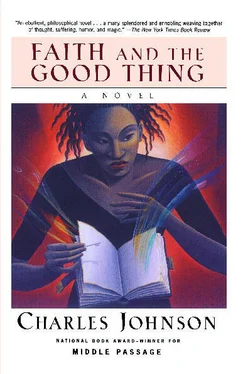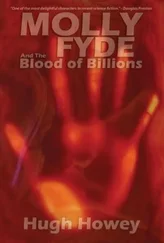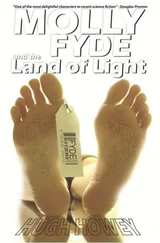“I guess not.” Faith shook her head to clear it. “But—”
“Quiet! I’m conjurin’!” the Swamp Woman shouted. “And you looked a li’l bit further, and saw that nothin’ in the inner or outer world was you; it was all outside of you, separated by space and time and primary qualities and Ding-an-sichs and — hah! It made you wonder what you were, didn’t it? Don’t answer! Yes! Instead of bein’ one with every object, every object became a thing apart from ya — ya even became a thing to y’self! So ya broke your bonds with the world when ya got smart. That’s part of bein’smart, ain’t it? Object-ivity: standin’back away from the world to check it out. Don’t answer! It’s true: ya broke ’em, sweetheart, ’n ya couldn’t live a good life no more until ya found out what the universe was doing. Sho! That made sense — find out what the universe was doin’, then get in harmony with it. Yes, yes! But how? A pineal gland? The negation of the negation? Faith? Christ on the Cross? Back to Nature? How, girlie?”
Faith cringed. The Swamp Woman was making it appear hopeless. “I don’t know! You’re right, you do have to know what the Good Thing is before you can get right with it—”
“Nonsense!” The werewitch cackled. “Ya think too damned much!” She sneered, poking her pointed tongue through the left side of her skull. “The Good Thing. What’s that? Hee hee. I’ll tell ya: when the struggle with synthetic systems has been fought out and the battle seemin’ly won, when the mind has categorized animals, vegetables, minerals, and all the rest, when the levels of reality have all been systematized, taxonimized, and bled dry in the antiseptic laboratories of a reason loosed from all restraint, then and only then does the mind grow weary of system — it grows blank and cool and clear and capable of conjurin’ not only what the categories and tables of judgment can’t contain, but also that in which the heart of men, beasts, and birds revel: love.”
“The Good Things’s love?” Faith cried.
“Don’t pin me down!” the werewitch wailed. “If you ask me ’gain, I’ll say it’s hate. Ask me thrice, and I’ll say it’s neither, ’cause the Good Thing’s spontaneous; it’s absolutely nothin’, but particularly it’s everythin’.”
Faith did not take her gaze from the wooden floor. “So all I did was for nothing?”
“Nothin’?” The Swamp Woman roared. “You mean I’ve been wastin’ my breath? Wasn’t that story ’bout Kujichagulia good?”
“Yes, but—”
“And wasn’t it — well, you know the rest, girlie. I see I can’t explain nothin’ to ya when ya wants demonstration.” She snickered, “Damn fool empiricist,” and pointed behind Faith to the window. “Just look outside.”
Confused, Faith pulled back the thin curtain to the window (it was, she realized, made of skin — great strips sewn together with human hair). Light burst in thin blue beams that caused her to blink, opening and closing her eyes quickly until she could see. It was dawn, a time that had always taken hold of something in her blood; dawn, a new beginning; dawn, a moment both still and serene, suggesting that her long night of questioning had been quite unreal. Around the shanty, coming in waves from the swamp, was the sustained orchestration of songbirds: hooting, cooing, chirping, squawking, and crying on the unseen undercurrent of the wind. There rang out a melody from a wren, and somewhere in the wild bush a bullfrog answered; and with each call another came, louder, competitively as if the birds and bullfrogs, wise as philosophers in their own way, were in a contest to celebrate the coming of day when dull mankind slept and only the sensuous, long-suffering trees could hear. She saw an elm towering over the other trees in the distance, waving its highest branches in the breeze. Todd Cross. She was certain. Certain of everything. Certain the air was cool and scented with the clean smell of dew. Certain the wind pushed on, and the birds swung into the empty sky like sleek arrows, no destination, no duty, no destiny in mind. Daylight came, their sweet lays drifted away.
“Hee hee! Systematize that !” The Swamp Woman laughed. “It makes ya feel stupid, don’t it?” Then she was dead serious. “Who says ya gotta understand the universe to love, to conjure it, girlie?” As ghastly as a corpse freshly unearthed from its crypt, the werewitch returned to the box from which she’d taken the mojo of Alpha Omega Jones. Grumbled: “On every path you take you’ll find a li’l bit of the Good Thing and vexations as well. Try my path, why don’t ya?”
Faith, for the first time, understood.
The Swamp Woman removed a fresh suit of skin from the box. She slipped it on, tugging at its loose seams, then zipped up the back. Faith held her breath: the hair on the suit was formed around its head in a full mushrooming natural; the skin was creamy and the color of caramel, the eyes in the head were slightly asymmetrical, and the breasts — small.
“Ya feed the manticore out back for me,” the Swamp Woman said, “and don’t let the cockatrice outta its cage.” A devilish glint exploded in her dark eyes. “I ain’t never been a foolish young girl, ain’t never tasted the Good Thing in quite that way.” She started toward the door, young again, smiling, and emerged into the glare and promise of day.
“Watch out for Arnold Tippis,” Faith called. But the werewitch was gone. Faith almost knew what she would encounter, could predict it, because she’d been there herself. That awareness made her feel like an oracle. It convinced her that prescience was not so much a gift of magic as it was the product of experience. Flipping a dry toadstone over in her palm, she wondered if other magical feats were also at her command. The only way to know would be to start a new path. To step into the Swamp Woman’s abandoned skin. Faith left the toadstone on the workbench and walked to the boil-marked skin by the door; she examined the manufacturer’s label sewn on the inside of the collar (Elysium) and, finally, slipped it on.
Nothing immediately came of that.
The skin fit perfectly around her body, but was slack at her fingers like an oversized glove. The fingertips swung empty at her sides; the rest was as tight as hosiery. And creeping through her mind were the most marvelous thoughts: formulas for elixirs and potions flashed before her single eye, and faraway she heard the moaning of dead spirits on the wind, the chilling mi, fa, mi of the earth. She knew, in an intuitive, immediate way freighted with love and hate and, somehow, neither, whether Plato was really Socrates; how to concoct love potions from lion powder; how the pineal gland linked res extensae and res cogitantes but left the problem of mind-body dualism unresolved; the cryptic runes for raising the dead and parting waves; and the meaning of pre- and pronormative ethics on the methodeutic measure of Firstness, Secondness, and Thirdness. Her mouth pushed forward with glee:
“Hee hee!”
She’d suffered several roles: the innocent, the whore, the housewife. And now, the werewitch herself. There would be others. There had to be. She was more than any one path, or the total of them all. She would glean from each its store of the Good Thing, would conjure it up: the enthusiasm and naïveté of youth, the self-sacrifice of the streetwalker, and the love that even the most miserable housewife received — exhausting them, moving on to another path, and another. That was life, children. And when she’d traveled the existing paths, she would create a new, untrodden one. That was progress. If she discovered X number of paths and traveled them all, then she, before she died, would leave X-plus-1. That was responsibility: factoring the possible number of paths to the Good Thing, but not becoming fixed, or held to those paths in her history, or the history of the race. Moving always on.
Читать дальше












